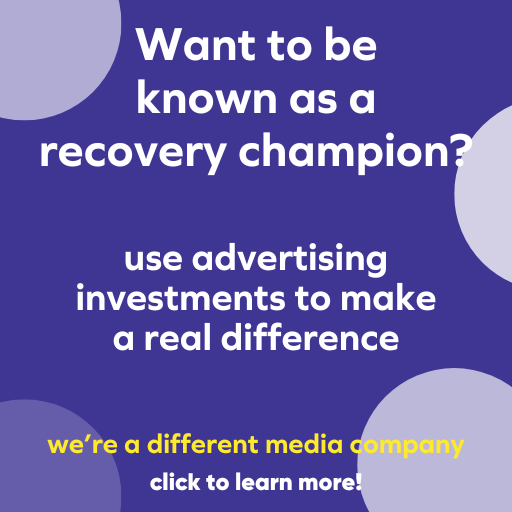“I think the biggest thing for me was learning to have fun again without alcohol.”
I like to look ahead and focus on all the positives and the benefits of sobriety, on the things I can do now that I couldn’t do 10 years ago,” says Steve.
Currently, Steve is an elementary school principal in the largest elementary school in Maine. Also, he’s a dad to three children; a 3-year old preschooler, a 5-yea old kindergartener, and a 7-year old fi rst grader. Steve is from New Hampshire originally, and he went to college in upstate New York. After college he spent time in California, Arizona and DC before settling in Portland. Additionally, he was a teacher and a coach before becoming an administrator twelve years ago. Steve’s experience with alcohol and substance abuse started like a typical college student’s often does.
“I was a really good college student and a college athlete, but weekends were all about partying. I sort of just got into
the binge drinking culture; train all week and go to class all week, and then party hard on Saturdays after the race or match or game. That continued into my twenties. I played rugby. I was always doing 5Ks and 10Ks and some marathons. I boxed and trained in MMA. I would work hard all week but then the weekend would come around,
and I would party. Nothing really terrible happened, so I didn’t see it as an issue at the time.”
This trend of working hard all week and drinking on the weekends continued through his thirties. It’s at this time that he had become a dad and was not as busy outside the home during the week as he used to be. He was at home spending time with the kids. With all this time at home on his hands, Steve started drinking during the week. Then it became almost a daily occurrence.
“It was shortly before my first daughter was born in 2015, that I just said something has to change. I tried rules and parameters and moderation and setting limits for myself. That would work for a few weeks or a few months; then invariably I’d have another setback or a bad night. It was starting to get embarrassing, and shameful It started to damage my relationships. I always felt tired and sick and ashamed of myself. Finally, in early 2018, I said enough is enough. From then on, I found a lot of great resources and a lot of great support. I attended AA meetings for a while, but when you’re somebody who works 55 hours a week and has three small children, it’s hard to go to an evening meeting. Being a former athlete, I knew I had to get back to who I was at my core, and that visceral way of living.”
Steve worked at finding and creating a program that would help him despite his busy schedule. Morning workouts and reading memoirs by other drinkers became a huge part of his personal recovery program. “This former Marine, Jocko Willink, he’s a teetotaler, and he gets up at 4:34 AM, seven days a week to work out. I started doing that in 2018. There’s this other similar approach called “Savers” where they talk about starting your day with some exercise, reading and reflection, and taking time for yourself. I’ve been doing that ever since and it’s made a big difference for me. By the time 7:00 or 8:00 PM rolls around, I’m too tired to even want to think about drinking. I make the joke about making sure I wake up before my demons and get a head start on them.”
Strategies Steve Employs to Avoid Drinking Again
Consequently, Steve had to relearn how to deal with stress. Before, alcohol would be the go to decompressor whenever he had a bad day or whenever he wanted to unwind.
“You have to fi nd new ways to decompress. Do whatever you have to do in those first few weeks to not go back to that same craving. You have to forgive yourself. I tried a lot of different things for the first couple of years and today I do a lot of different things. I took the money I was saving on craft beers and used it to build up my home gym in the basement. Now I always have a place to burn off stress.”
The role of community in Steve’s recovery
Talking to somebody is the first step to getting help and finding recovery. The community always plays a significant role in one’s recovery journey. Steve’s case wasn’t different; talking to people who understand
Advice to people fighting addiction
“It’s important for people to know that you can build your own program. It’s your life. For me, 12 step meeting programs are maybe 5% to 10% of what I consider my program. I was an English teacher and an English major, so I love to read. Reading memoirs was a huge part of my approach that first year. Getting up early and working out, and then devoting the very end of my day to reading and relaxing, listening to music, borderline meditation. And I probably drink eight seltzers a day.
Do what works for you personally, whatever that looks like. It’s going to be a little different for everybody. Experiment and write things down and create a collection of strategies and tools that work for you. Things start to be more manageable.
Maybe not in the ways you expected.
I wrote a piece on The Medium about the 22 books I read in that first year sober.
I was pretty happy to feel like I was creating again, instead of just consuming.
Working on being a father, an athlete, maybe a writer, I feel like I’m myself again without alcohol in my life.”
– As told to Journey team member, Mary Atwood





